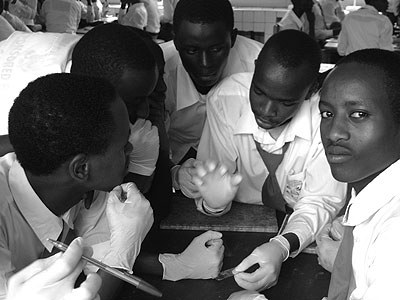There is always anxiety whenever the officials of the Rwanda Education Board release the national examination results for primary six, senior three and senior six. This period is commonly referred to as the moment of truth. It is the time when the public gets to know who is who in terms of academic performance.


There is always anxiety whenever the officials of the Rwanda Education Board release the national examination results for primary six, senior three and senior six. This period is commonly referred to as the moment of truth. It is the time when the public gets to know who is who in terms of academic performance.
Upon the release of such results, the public bases on the trend in the performance of the various schools to determine the academic giants and the dwarfs. I am a bit uncomfortable with this yardstick of rating schools.
The public should know that the schools that admit only the cream cannot produce the same results as those that admit all categories of learners. The other factor is that some schools have more resources than others and this impacts greatly on the performance of the learners. So, it is wrong to assume that schools that excel are the ones with good teachers.
I think that the main objective of a school is to impart knowledge and skills in the minds of the learners such that they can become self-reliant in future. This does not mean that I am cynical about competition among schools. My focus is on the bigger picture. I am interested in seeing learners who leave school when they are able to direct themselves to contribute to national development.
If a given learner excels in the national examination and his way of doing things reflects that he is empowered with skills for self-sustenance, then such a learner is excellent indeed. However, if he excels in the examinations when he cannot base on what he learnt at school to sustain himself thereafter, I would not consider him as an excellent performer.
I believe that it is prudent for the public to desist from judging schools basing on the number of top performers that appear in the newspapers. It does not necessarily mean that those who do not appear in the newspapers are poor performers in both the examinations and other life situations. The public should not create wasteful competition whereby some schools end up drilling learners to excel in the examinations to show that they are very good.
The most important point is for the Ministry of Education in conjunction with Rwanda Education Board to set minimum standards that public and private schools should adhere to in order to inculcate the right skills, knowledge and values in the minds of all the learners.
I know that this objective can easily be achieved given the fact that there are already school-based and senior mentors who provide technical support to the teachers in terms of pedagogy. With this kind of arrangement, the country can easily achieve her educational goals. Otherwise, if the public continues to praise the top performing schools and look down upon those that do not appear in the media, it will continue to affect the self-esteem of the students whose schools do not always appear among the best performers and they may think that they do not have the potential to contribute to the development of their country.
I would like to suggest that focus should be at district level where there may be favourable competition among the schools unlike a situation where schools in Kigali city are ranked together with those in the countryside. Some people may think that effective learning does not take place in the countryside.
However, if the media focuses on the top performing schools per district, there will be a fair representation of the schools in the entire country and it may also help the policy makers to make the necessary interventions to help the districts that may not register relatively good performance.
Therefore, I would advise the public to judge schools basing on their ability to make the learners self-reliant.
The writer is a teacher at Riviera High School


